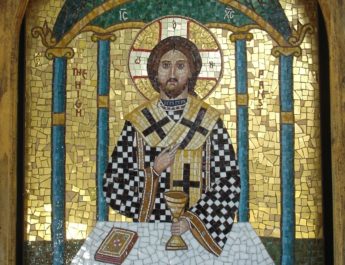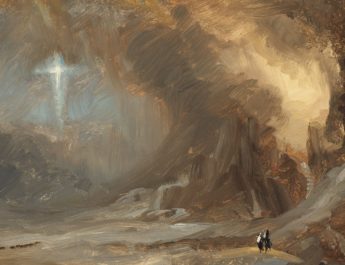Mark 12:26-27a
NL 204
26 And as for the deadA being raised,B have you not readC
A “dead” = nekros. Perhaps from nekus (corpse). This is dead or lifeless, mortal, corpse. It can also be used figuratively for powerless or ineffective. It is where the word “necrotic” comes from.
B “raised” = egeiro. This is to awake, raise up or lift up. It can be to get up from sitting or lying down, to get up from sleeping, to rise from a disease or from death. Figuratively, it can be rising from inactivity or from ruins.
C “read” = anaginosko. From ana (upwards, up, again, back, anew) + ginosko (know, recognize, learn from firsthand experience). This is literally to know again – to recognize, read, or discern.
in the bookD of Moses,E in the story about the bush,F
D “book” = biblos. 10x in NT– 5x in reference to books of the Bible, 3x of the book of life, 1x of genealogical account of Jesus, 1x of books of magic. Perhaps from bublos (papyrus); from Phoenician Byblos (a Phoenician city that exported papyrus for writing); {from gb (well, origin) + I (God)}; from Proto-Canaanite g-b-l (Gubla – maybe meaning to border). This is the inside bark of papyrus so it could refer to anything that was written on – a scroll, book, record, roll. It could also have an association with the sacred. See https://en.wiktionary.org/wiki/bible
E “Moses” = Mouses. From Hebrew Mosheh (Moses); from mashah (to pull out in a literal or figurative sense, to draw out) OR from Egyptian mes or mesu (child, son i.e. child of…). This is Moses – the one drawn out from the water, which is to say, rescued. If derived from the Egyptian, his name would share a root with Rameses and Thutmose.
F “bush” = batos. 5x in NT– 4x of the burning bush & 1x of a bramble bush. This is a bush, perhaps a thorn bush.
how GodG said to him,H ‘I am the God of Abraham,I the God of Isaac,J and the God of Jacob’?K
G “God” = Theos. From Proto-Indo-European origins, meaning do, put, place. This is God or a god in general.
H {untranslated} = lego. This is to speak, say, name, call, command. It is generally to convey verbally.
I “Abraham” = Abraham. From the same as Abiram (exalted father, a high father – lofty) {from ab (father literal or figurative) + rum (rise, bring up, being high, extol, exalt, haughty; to raise in a literal or figurative sense)}. This is Abraham, father of many nations or father of a multitude.
J “Isaac” = Isaak. From Hebrew yitschaq (Isaac, “he laughs”); from tsachaq (to laugh, mock, play, make sport; this is laughing out loud whether in joy or in a scornful way). Isaac, meaning “he laughs.”
K “Jacob” = Iakob. From Hebrew Yaaqob (Jacob); from the same as aqeb (heel, hind part, hoof, rear guard of an army, one who lies in wait, usurper). This is James, meaning heel grabber or usurper.
27 He isL God not of the dead but of the living;M you are quiteN wrong.”O
L “is” = eimi. This is to be, exist.
M “living” = zao. This is to live literally or figuratively. It is used for life including the vitality of humans, plants, and animals – it is life physical and spiritual and life everlasting.
N “quite” = polus. This is much, often, plenteous – a large number or a great extent.
O “are…wrong” = planao. From plane (wandering – used figuratively for deceit, error, sin, fraudulence, or wandering from orthodoxy); from planos (wandering, misleading, a deceiver or imposter). This is to wander, lead astray, mislead, mistake, seduce, or deceive. Generally used to refer to sin – going off the right path or roaming from truth/virtue. This word shares a root with “planet” (as a heavenly body that wanders).
Image credit: “The Burning Bush Under the Milky Way” by Trey Ratcliff, 2022.




